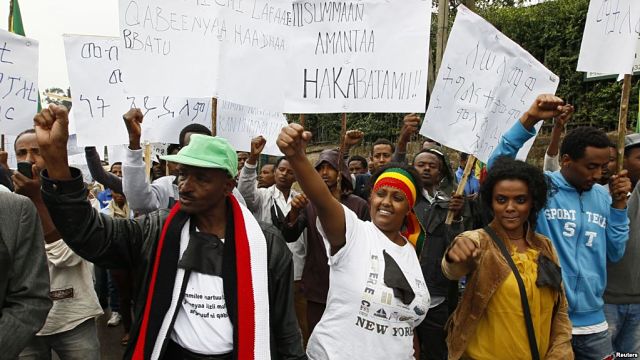 People protest against an earlier security force attack on a student rally in central and southern Ethiopia during a demonstration organized by the opposition in Addis Ababa, May 2014. (Reuters)
People protest against an earlier security force attack on a student rally in central and southern Ethiopia during a demonstration organized by the opposition in Addis Ababa, May 2014. (Reuters)
What began as a regional protest movement in November 2015, is in danger of becoming a fully-fledged armed uprising in Ethiopia.
Angered and exasperated by the government’s intransigence and duplicity, small guerrilla groups made up of local armed people have formed in Amhara and elsewhere, and are conducting hit and run attacks on security forces. Fighting at the beginning of January in the North West region of Benishangul Gumuz saw 51 regime soldiers killed, ESAT News reported, and in the Amhara region a spate of incidents has occurred, notably a grenade attack on a hotel in Gondar and an explosion in Bahir-Dar.
In what appears to be an escalation in violence, in Belesa, an area north of Gondar, a firefight between ‘freedom fighters’, as they are calling themselves, and the military resulted in deaths on both sides. There have also been incidents in Afar, where people are suffering the effects of drought; two people were recently killed by security personnel, others arrested. The Afar Human Rights Organization told ESAT that the government has stationed up to 6000 troops in the region, which has heightened tensions and fuelled resentment.
Given the government’s obduracy, the troubling turn of events was perhaps to be expected. However, such developments do not bode well for stability in the country or the wider region, and enable the ruling regime to slander opposition groups as ‘terrorists’, and implement more extreme measures to clamp down on public assembly in the name of ‘national security’.
Until recently those calling for change had done so in a peaceful manner; security in the country – the security of the people – is threatened not by opposition groups demanding human rights be observed and the constitution be upheld, but by acts of State Terrorism, the real and pervasive menace in Ethiopia.
Oppressive State of Emergency
The regime’s response has been consistently violent and has fuelled more protests, motivated more people to take part, and brought supressed anger towards the ruling EPRDF to the surface…Unwilling to enter into dialogue with opposition groups, and unable to contain the movement that swept through the country, in October 2016 the government imposed a six-month ‘State of Emergency’…The directive places stifling restrictions of basic human rights, and as Human Rights Watch (HRW) states, goes “far beyond what is permissible under international law and signals an increased militarized response to the situation.”
—
Join the conversation on Twitter and Facebook.

























